P.S. From Paris (US Edition) Read online
Page 2
“Wow. I forgot you have a walk-in closet.” Daisy snorted. “Anyway. What happened next?”
“I pretended to be asleep. He got undressed in the bathroom and took a nice, long shower, then hopped into bed and turned off the light. I was waiting for him to whisper something, to give me a kiss. But maybe his ‘batteries’ hadn’t fully recharged, ’cause all he did was fall fast asleep.”
“You want my opinion? Don’t answer, I’m going to give it to you anyway. You married a bastard. The real question, and a simple one, is to figure out whether the good outweighs the bad. No, forget that. The real question is why you’re in love with him in the first place if he makes you so miserable. Unless you’re in love with him because he makes you so miserable . . .”
“He made me very happy . . . at the beginning.”
“I sure hope so! If all relationships started badly, Prince Charming would disappear from every fairy tale ever written and romantic comedies would be filed under horror. Don’t look at me that way, Mia. If you want to find out if he’s cheating, you need to ask him, not me. And put that out—you won’t find love at the end of a cigarette.”
Tears streamed down Mia’s cheeks.
Daisy sat next to her friend and put her arms around her.
“Go ahead—let it out, if it makes you feel better. A broken heart hurts like hell, I know, but it’s better than being so empty you’ve got nothing to cry about.”
Mia had sworn to remain dignified under any circumstances, but with Daisy it was different. They had been friends for so long, they were like sisters.
“What are you talking about, empty?” she asked, wiping away her tears.
“Wow. Is that your way of finally asking me how I am?”
“Don’t tell me you’re alone too. Oh, Daisy, I’m afraid we’re never going to find happiness.”
“Seems to me you came pretty close, these past few years. You’re famous, a well-respected actress, you make more for one film than I could in a lifetime . . . and you’re married. I mean, take one look at the news, the terrible things happening in the world, you’ll see we can’t really complain.”
“Why, what happened?”
“I don’t have a clue, but if there’d been any good news, people would be out on the streets celebrating. What did you think of my chanterelles?”
“I think they work better than antidepressants.”
“Music to my ears. Anyway, bedtime now. Tomorrow, I’ll call your chump of a husband, tell him you know everything and that he betrayed the most wonderful woman I know, and now you’re leaving him—not for somebody else, but just to be rid of him. He’ll be the one in tears by the time I’m done with him.”
“You’re not really going to do that, are you?”
“No, I’m not. You are.”
“I couldn’t even if I wanted to.”
“Why, because you actually want to waste more time wallowing in a crappy melodrama?”
“No, because that big-budget film we’re costarring in opens in one month, remember? Not only do I have to do the press junket, I have to play a part offscreen too: the happiest woman in all of England. If people find out the truth about me and David, the sparks go out onscreen as well. The producers, my agent . . . they’d never forgive me. And while I’m not going to sit around in denial about his cheating, I don’t need to add public humiliation on top of it all.”
“You ask me, only a heartless bitch could pull off a role like that.”
“Why do you think I ran off to Paris?”
“I see. For how long?”
“As long as you can stand me.”
3
At Porte de la Chapelle, the Saab convertible cut diagonally across three lanes, ignoring the flashing headlights of other cars, and left the beltway to join the A1 highway toward Roissy–Charles de Gaulle.
“Why do I always have to go and get him at the airport? Friends for thirty years, but Arthur’s never picked me up at the airport. I’m too nice. That’s my problem. He and Lauren wouldn’t even be together if it weren’t for me. Is it too much to ask, just to show a tiny bit of gratitude? Apparently, it is!” Paul Barton muttered, stealing a peek at himself in the rearview mirror. “I mean, sure, they made me Joe’s godfather, but who else were they gonna ask? George Pilguez? Ha! Good luck with that.
“You know, if the guy behind me flashes me one more time, I’m pumping the brakes! I’ve got to stop talking to myself. Then again, who else am I supposed to talk to? The characters from my novels? God—I sound like an old man. At least they can talk to their kids or grandkids. I’d better get around to that, having kids. Before I get old and senile.”
He looked at himself in the rearview mirror again.
The Saab pulled up at an automatic tollbooth, and Paul grabbed the ticket from the machine. “Thank you,” he said out of habit, closing the window.
According to the arrivals board, flight AF83 was on time. Paul fidgeted and paced back and forth impatiently.
The first passengers began to enter the baggage-claim area, but only a few. Those in first class, probably.
Following the publication of his first novel, Paul had decided to put his career in architecture on hold. He had discovered an unimaginable freedom in writing. It was completely unpremeditated; he simply enjoyed the process of filling page after page—nearly three hundred of them by the time he typed THE END. Every evening, he found himself in the grip of his story. He stopped going out almost entirely and took to eating dinner in front of his computer.
At night, Paul became part of an imaginary world where he felt happy, in the company of characters who had become his friends. When he was writing, anything was possible.
It had all begun when that first novel was merely a finished stack of papers left on his desk.
Paul’s life then changed dramatically a few weeks later, when Arthur and Lauren had invited themselves over to his house for dinner. As the evening stretched on, Lauren received a call from one of the hospital administrators. She asked Paul if she could take it in his office so he and Arthur could continue their conversation in the living room.
While taking the call, Lauren spotted the manuscript and began reading it. She was so captivated that she lost track of her conversation.
After the call with Professor Kraus ended, Lauren went on reading. A good hour went by before Paul poked his head inside the office to check that everything was all right and found her there, smiling to herself.
“Oh, sorry, am I disturbing you?” he called out, making her jump.
“You do know this is brilliant, right?”
“It didn’t cross your mind to ask permission before you started reading?”
“Can I take it home to finish it?”
“Don’t answer my question with another question.”
“You started it! So can I take it home?”
“Do you really like it?” Paul asked, the doubt leaking through in his voice.
“Yes, I really do!” Lauren replied, gathering up the pages.
Then she took the manuscript and went back into the living room, passing straight by Paul without another word.
“I don’t recall actually saying yes!” he protested as he caught up with her.
And then, under his breath, he told her not to mention it to Arthur.
“Yes? Yes to what?” Arthur cut in, getting up from his seat.
“I can’t even remember,” Lauren told him. “Let’s go. Are you ready?”
And before Paul had time to react, Arthur and Lauren, already standing outside on the porch, thanked him for a lovely evening and were gone.
Other passengers appeared, in greater numbers this time. At least thirty, but still not the ones he had come to meet.
“What are they doing, vacuuming the plane? God, just thinking about these two brings back so many memories. Makes me think of what I really miss from back home. The house in Carmel . . . I used to love going there for the weekend, hanging out with them, watching the sunset on the be
ach. It’s been almost seven years since I moved to Paris . . . Skype is better than nothing, but it’s not the same as in-person visits. Actually, I should really talk to Lauren about my recurring migraines—that’s her field. No, she’ll want me to get them checked out. They’re just migraines. It’s ridiculous—not every headache means a brain tumor. And if it was a tumor, I guess I’d find out anyway, sooner or later. Are they ever going to get off that plane?”
That fateful night, Green Street had been deserted. After parking the Ford Focus in the lot, Arthur had opened the door for Lauren and together they had climbed the stairs to the top floor of the small Victorian house where they lived. It was unusual for a couple to have shared the same apartment before ever having met each other, but that was a whole other story.
Arthur had to finish some sketches for a major client. He apologized to Lauren and kissed her before sitting down at his architect’s table. Lauren wasted no time getting into bed and picking up where she had left off in Paul’s novel.
Several times, Arthur thought he heard laughter coming from the other side of the wall. Each time, he glanced at his watch, then picked up his pencil again. Later that night, hearing sobs this time, he stood up, quietly opened the bedroom door, and found his wife lying in bed reading something.
“What is that?” he asked, concerned.
“Nothing,” she replied, closing the manuscript.
She grabbed a tissue from the bedside table and sat up straight.
“Aren’t you going to tell me why you’re so sad?”
“I’m not sad.”
“Did you get some bad news about a patient?”
“No, good news, actually. Very good news.”
“Good news is why you’re crying?”
“Why don’t you come to bed?”
“Not until you tell me why you’re still up.”
“I don’t think I’m allowed to tell you.”
Arthur stood squarely in front of Lauren, determined to extract a confession.
“It’s Paul,” she blurted out finally.
“What, is he sick?”
“No, he’s written a . . .”
“Written a what?”
“I really should ask his permission . . .”
“There are no secrets between Paul and me.”
“Apparently, there are. Don’t worry about it. Come to bed, it’s late.”
The next evening, Paul was at the agency when he received a call from Lauren.
“I have to talk to you. My shift ends in a half hour. Meet me at the coffee shop across from the hospital.”
Perplexed, Paul put on his jacket and left his office. He bumped into Arthur outside the elevator.
“Where are you headed?”
“To pick up my wife from work.”
“Can I ride over there with you?”
“Are you sick or something, Paul?”
“Let’s go, I’ll explain later.”
When Lauren appeared in the hospital parking lot, Paul rushed over and cornered her. Arthur stood watching for a moment before deciding to join them.
“I’ll catch up with you at home,” she told him. “Paul and I need to talk.”
And, leaving Arthur on his own, they entered the coffee shop.
“Did you finish it?” Paul asked after dismissing the waitress.
“Yes, last night.”
“And you liked it?”
“A lot. I noticed quite a few things in there about me, actually.”
“Yeah, I know. I should have maybe . . . asked your permission about that.”
“Wouldn’t have hurt, I have to be honest.”
“Anyway, nobody but you will ever read it, so . . .”
“Well, that’s what I wanted to talk to you about. You have to send this to a publisher—I’m sure it would get published.”
Paul wouldn’t consider it. First of all, he didn’t believe for a minute that his novel might interest a publisher. And even if it did, he wasn’t sure he liked the idea of a stranger reading what he had written.
Lauren used every argument possible, but Paul wouldn’t budge. On her way out, Lauren asked if she could share their secret with Arthur. Paul pretended not to have heard her.
Back home, she handed the manuscript to Arthur.
“Here,” she said. “We’ll talk after you’ve read it.”
Then it was Lauren’s turn to listen to Arthur laughing repeatedly, to wait during the ensuing silence for the emotion that overcame him on reading certain passages. Several hours later, he joined her in the living room.
“Well . . . ?”
“Well, the story is basically inspired by you and me, but I really like it.”
“I told him he should send it to a publisher, but he won’t do it.”
“I can understand that.”
Getting Paul’s story published became an obsession for the young doctor. Whenever she saw him or talked to him on the phone, she would ask him the same question: Had he sent off the manuscript yet? Each time, Paul said no and urged her to stop asking him about it.
Then one Sunday, late in the afternoon, Paul’s phone rang. It wasn’t Lauren but an editor from one of the New York–based publishing houses.
“Ha-ha, very funny, Arthur,” Paul said, irritated.
Surprised, the caller said that he had just finished reading a novel that he’d enjoyed immensely, and that he wished to meet the author.
They continued talking at cross-purposes for a while, Paul making more and more jokes. Going from amused to exasperated, the editor suggested Paul pay him a visit at his office in San Francisco the following day; that way he’d see it wasn’t a joke.
Suddenly, doubt crept into Paul’s mind.
“Just how did you get hold of my manuscript?”
“A friend of yours sent it to me.”
And, after the editor gave Paul the address for their meeting, the call ended. Paul paced up and down his apartment until he could stand it no longer, then jumped into his Saab and drove across the city to San Francisco Memorial Hospital.
In the ER, he asked to see Lauren immediately. The nurse pointed out that he didn’t look especially sick. Paul glared at her and growled that not all emergencies were the medical kind. If she didn’t page Lauren in two seconds, he was going to make a scene. The nurse started motioning for the security guard. Disaster was narrowly averted when Lauren spotted Paul and came over.
“What are you doing here?”
“Do you have a friend who’s a publisher?”
“No,” she replied, shifting her gaze.
“Does Arthur?”
“Not at all,” she muttered.
“Is this another one of your pranks?”
“No. Not this time.”
“Just what did you do, Lauren?”
“I didn’t really do anything. The decision is still up to you.”
“Elaborate. Please.”
“One of my colleagues has a friend who is an editor at a publishing house. I gave him the manuscript, just to get an outside opinion.”
“You had no right to do that.”
“I seem to recall you once doing something for me that I hadn’t asked you to, and today I’m grateful for it. All I did was give fate . . . a little nudge. Like I said, it’s still totally up to you, the decision is all yours.”
“What decision?”
“Whether you want to share what you’ve written with other people. Your story might bring a little happiness to people’s lives. And these days, that’s a tall order. Anyway, I have to get back to work now . . .”
She turned toward the doors of the ER.
“Of course, don’t thank me, whatever you do,” she added.
“Thank you for what?”
“Go to that meeting, Paul. Don’t be stubborn. And, in case you’re wondering, I still haven’t said a thing to Arthur.”
Paul went to meet the editor who was interested in his novel, and gave in to his offer. Each time he heard the word novel, he h
ad a hard time making the connection with the story that had filled his nights at a time in his life when he wasn’t very happy.
The novel was published six months later. The day after it was released in bookshops, Paul found himself sharing the elevator at work with two architect colleagues, both of whom were holding a copy of his book. They congratulated him, and Paul, in a state of shock, waited until they got out before pressing the ground-floor button. He went to the coffee shop where he had breakfast every morning. The barista asked him to sign the copy she had bought. Paul’s hand trembled as he held the pen. He paid his bill, went back home, and began to reread his novel.
With every page, he sank a little deeper into his chair, wishing he could melt into it and never have to come out again. He had put a part of himself into the book, part of his childhood, his dreams, his hopes and failures. Without realizing it, without ever imagining that, one day, strangers would read it. Or, even worse, people he rubbed shoulders with, people he worked with. Paul, whose loud voice and friendly manner disguised an almost-pathological shyness, sat there wide-eyed and helpless, yearning only to become invisible, like the character in his book was. Paul went into hibernation—and was only forced to come out when Arthur knocked on his door and drove him out of his hideaway. Unlike Paul, Arthur was delighted by the book’s reception, and he brought good news.
The originality of the story had captured the media’s attention. Maureen, the assistant at the architecture agency, had lovingly prepared a scrapbook of press clippings for him. Most of their clients had already read the book and called to offer their congratulations.
A film producer had tried to reach him at the agency and—Arthur kept the best for last—City Lights Bookstore, where he was a regular customer, had told him that the novel was selling like hotcakes. For the moment, his success was confined to the Bay Area, but at this rate, the bookseller was certain, it would soon spread across the whole country.
On the terrace of the restaurant where he had dragged Paul, Arthur told his friend he needed a shave, and to pay more attention to his appearance generally, to return his editor’s calls (the poor man had already left twenty messages at the office), and, above all, to embrace the luck that had fallen into his lap instead of moping around as if somebody had died.

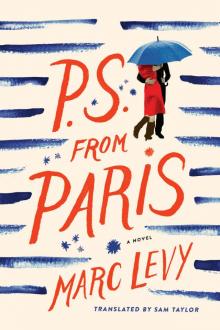 P.S. From Paris (US Edition)
P.S. From Paris (US Edition)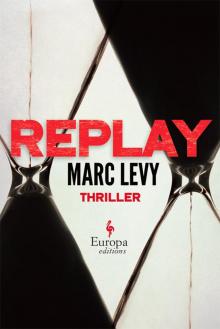 Replay
Replay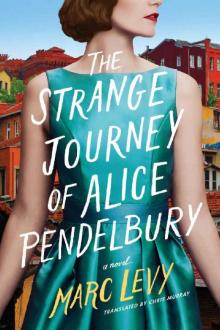 The Strange Journey of Alice Pendelbury
The Strange Journey of Alice Pendelbury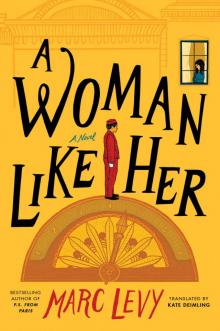 A Woman Like Her
A Woman Like Her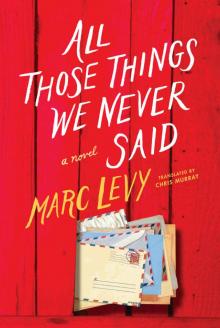 All Those Things We Never Said
All Those Things We Never Said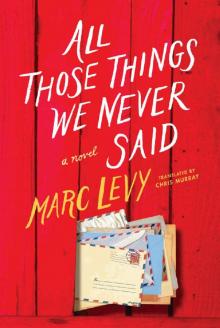 All Those Things We Never Said (US Edition)
All Those Things We Never Said (US Edition)